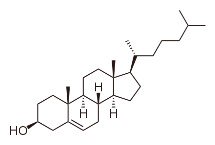Inflammation and Cholesterol – The Real Cause of Heart Disease
Inflammation and cholesterol together are responsible for the narrowed arteries that lead to heart attacks and strokes. Artery inflammation is a silent killer you can stop with antiaging therapies that address the causes of inflammation.
Most everyone knows that high levels of cholesterol have been associated with heart disease, but the real story is somewhat different than what most people believe. Cholesterol is just one factor in heart disease. Heart disease is caused by inflammation and simply lowering cholesterol will not prevent it!

Inflammation and Cholesterol
The relationship between inflammation and cholesterol is an interesting one and will surprise most people that have grown up with the idea that cholesterol causes heart disease. The truth is that artery inflammation is what causes heart disease, and cholesterol forms the plaques as a reaction to damage to artery walls caused by inflammation.
Statistically 50% of heart attack victims have what are considered “normal” cholesterol levels (between 180 mg/dl and 200 mg/dl.). This is not surprising when you consider the role and causes of inflammation, rather than just cholesterol levels.
Renowned cardiologist Stephen Sinatra has reported that some of his patients with high cholesterol levels have not had problems with heart disease, while others with normal cholesterol levels have had problems. He states that inflammation is the real key to understanding risk and preventing heart disease.
What are the causes of inflammation and how does it damage arteries?
Sugar and Inflammation
The relationship between sugar and inflammation is beginning to be understood more clearly. If you have been reading this website, you know that sugar raises insulin levels, and insulin is a “pro-inflammatory” hormone, meaning it causes inflammation in the body.
Check out The Great Cholesterol Myth" by Dr. Stephen Sinatra...
When we consume sugar we are raising the levels of inflammatory proteins in your body, and this causes artery inflammation. When arteries are damaged by inflammation, the body uses cholesterol to repair the artery walls, but the cholesterol becomes oxidized, hardens, and the arteries become occluded (clogged with cholesterol).
Pieces of this hardened plaque can break off and travel through the bloodstream to the brain causing a stroke. Thus cholesterol can be a factor in “cardiovascular events” like strokes, but is not the sole causative factor in heart disease.
Avoiding sugar as much as possible can help keep insulin levels down, and thus keep inflammation down as well. There are other causes of inflammation such as bacterial infections, trauma, heavy metal toxicity, and oxidative stress.
However the primary culprit is the relationship between sugar and inflammation. So the number one rule for preventing heart disease is to keep sugar consumption to a minimum!
Causes of Inflammation
There are many possible causes of inflammation in the body but they all stem from several main causes:
- Bacterial infections
- Physical injury and trauma
- Heavy metal toxicty
- High levels of insulin
- Hormonal imbalances
- Oxidative stress (free radicals)
Should You Lower Your Cholesterol?
This is an excellent question. Since we now understand the relationship between inflammation and cholesterol, and the effect of artery inflammation, does it still make sense to lower it? I think the answer is really in HOW your body handles cholesterol and how high the levels are.
Remember that cholesterol levels that are too low (160 mg/dL) are associated with elevated risk of cancer, stroke, depression, and Alzheimer's Disease.
The HDL/LDL ratio is VERY important when you look at cholesterol. HDL is protective partly because it is an antioxidant which prevents the cholesterol in your arteries from becoming oxidized (full of free radicals). You want to do the things which keep HDL levels high.
Excess cholesterol is removed from the bloodstream by bile acids which are in turn removed by fiber in your diet. If you are lacking in dietary fiber, then you will be retaining more cholesterol in your bloodstream than you should be.
So the answer is to make sure that you are giving your body the foods it needs to eliminate excess cholesterol in a normal and healthy manner. This way it will not become a problem.
What To Do
Here are some strategies that will help you keep artery inflammation to a minimum and prevent cholesterol from becoming a problem in your coronary arteries.
- Get plenty of fiber in your diet
- Test for heavy metal toxicity and eliminate it
- Use things like colloidal silver and xylitol to combat harmful bacteria
- Keep your sugar intake as low as possible
- Get plenty of antioxidants in your food and in supplement form
- Keep HDL levels high
- Eat for your blood type
- Use grounding to lower inflammation in your body
Knowing the relationship between inflammation and cholesterol means that you don't have to stress about your cholesterol levels, and instead can focus on eliminating the causes of inflammation and effectively protecting yourself against heart disease!
Click the link below to check out my brand new blog:
"Lower Cholesterol Naturally Now!"
Return from Inflammation and Cholesterol to Aging and Disease
Return from Inflammation and Cholesterol to Longevity and Antiaging Secrets
New! Comments
Care to comment? Feel free to leave your comments below!